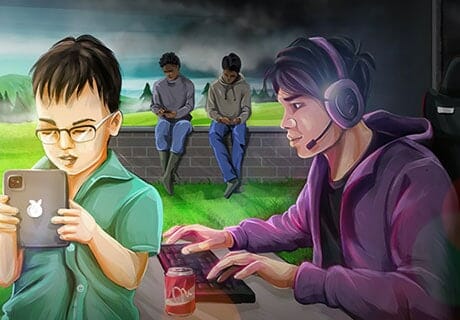Video Game Addiction in Children and Adolescents: Signs, Symptoms, and Strategies
The prevalence of video games and their increasing sophistication and immersive nature have made gaming a significant part of youth culture. Advances in technology, like online multiplayer games and mobile gaming, have made games more accessible and engaging. While video games can be a source of entertainment and social connection, their overuse can lead to addiction.
Table of Contents
What is Video Game Addiction?
Video game addiction, often referred to as gaming disorder, is characterized by a consistent pattern of gaming behaviour where individuals experience a loss of control over their gaming habits. This condition is marked by an escalating focus on gaming to the point where it overtakes other interests and daily activities. Additionally, individuals continue or intensify their gaming despite facing adverse consequences as a result of this behaviour.
Differentiating from Casual Gaming
 The critical distinction between video game addiction and casual gaming lies in the degree of engagement and its impact on the individual’s life. Casual gaming is a common leisure activity that doesn’t interfere with everyday responsibilities and social interactions. It’s characterized by controlled use, with the individual able to balance gaming with other activities, and it does not lead to significant distress or functional impairments in daily life.
The critical distinction between video game addiction and casual gaming lies in the degree of engagement and its impact on the individual’s life. Casual gaming is a common leisure activity that doesn’t interfere with everyday responsibilities and social interactions. It’s characterized by controlled use, with the individual able to balance gaming with other activities, and it does not lead to significant distress or functional impairments in daily life.
In contrast, video game addiction involves excessive and compulsive gaming behaviours that lead to significant impairment or distress. Individuals with this addiction often spend many hours gaming to the detriment of their social, academic, or occupational lives. Unlike casual gamers, those with a gaming disorder may neglect personal hygiene, skip meals, and lose significant sleep due to gaming.
Why It Happens: The Role of Dopamine and Other Factors
Dopamine, a neurotransmitter in the brain, plays a central role in the development of video game addiction. It’s often referred to as the “feel-good” chemical because it’s responsible for reward and pleasure sensations. When a child plays video games, especially those that involve achievements, rewards, or social interaction, their brain releases dopamine. This release creates a sense of enjoyment and a powerful internal reward system that can be as compelling as what is experienced in other forms of addiction.
Repeated exposure to these dopamine highs can lead to the development of tolerance. Over time, the child’s brain requires more gaming stimulation to achieve the same level of pleasure, leading to increased gaming duration and frequency. This neural adaptation is a cornerstone of the addiction process.
Psychological Factors
-
Escapism: Video games offer an escape from reality, which can be particularly appealing to children and adolescents facing stress, anxiety, or unhappiness in their daily lives. The immersive worlds of games provide a sense of relief from real-world problems.
-
Achievement and Competence: Games are designed to give a sense of achievement and competence. For some children, especially those who might struggle with self-esteem or face challenges in other areas of their lives, video games offer an arena where they can excel and feel more in control.
- Social Connectivity: Online games offer a community and social connection. For children who feel isolated or have difficulty with face-to-face interactions, the gaming world can provide a sense of belonging and a platform to interact with others.
Social Factors
-
Gaming Culture: The culture surrounding video games, including online communities, streaming, and eSports, can significantly influence children. Peer influence and the desire to be part of a community can encourage more prolonged and frequent gaming.
-
Parental and Environmental Influences: The role of family attitudes toward gaming, parental monitoring, and the home environment cannot be understated. Lack of alternative recreational activities or unsupervised access to gaming devices can contribute to excessive gaming.
- Media and Marketing: The way games are marketed and portrayed in media also plays a role. The constant promotion of new games, updates, and in-game rewards can create a compelling environment that encourages continuous play.
Video game addiction in children and adolescents is a complex issue influenced by a combination of dopamine’s impact on the brain’s reward system, psychological needs for escapism, achievement, and social connectivity, as well as broader social and environmental factors. Understanding these underlying causes is crucial for effective prevention and treatment strategies. As always, it’s important to approach this issue with empathy and a comprehensive understanding of the unique challenges facing today’s youth.
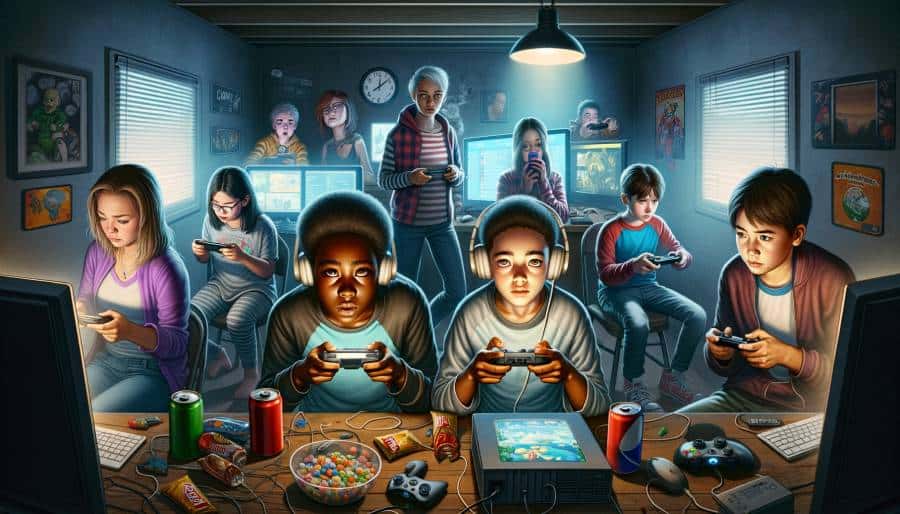
Symptoms and Warning Signs
Here are a range of symptoms and warning signs associated with video game addiction in children and adolescents. Recognizing these signs is crucial for early intervention and effective support. Video game addiction can manifest in various ways, including behavioural, physical, and emotional symptoms.
Behavioural Symptoms
-
Increased Time Spent on Gaming: A significant increase in the amount of time spent playing video games, often at the expense of other activities.
-
Loss of Interest in Other Activities: Diminished interest or participation in previously enjoyed activities outside of gaming, such as sports, hobbies, or socializing with friends and family.
-
Neglect of Responsibilities: Failing to keep up with academic assignments, chores, or other responsibilities due to gaming.
-
Secretive or Deceptive Behaviour: Hiding the extent of their gaming, lying about how much time they spend playing, or sneaking to play games.
-
Continued Gaming Despite Problems: Persisting in gaming even when it causes conflicts with family or friends or contributes to declining academic performance.
-
Withdrawal Symptoms: Experiencing irritability, anxiety, or sadness when unable to play video games.
Physical Symptoms
-
Sleep Disturbances: Changes in sleep patterns, such as staying up late to play games, difficulty sleeping, or excessive fatigue due to late-night gaming sessions.
-
Neglect of Personal Hygiene: Decreased attention to personal hygiene and grooming.
-
Physical Discomfort: Experiencing headaches, eye strain, or carpal tunnel syndrome symptoms due to prolonged gaming sessions.
-
Changes in Eating Habits: Skipping meals or opting for quick, unhealthy snacks instead of regular, balanced meals.
Emotional Symptoms
-
Mood Swings: Exhibiting irritability, anger, or frustration when not playing games or when gaming is interrupted.
-
Decreased Social Interaction: Withdrawing from family and friends to spend more time gaming.
-
Emotional Dependence: Using gaming as a primary method for coping with stress, anxiety, or depression.
-
Decreased Academic Performance: A noticeable drop in grades or school performance due to time and attention being diverted to gaming.
- Low Self-Esteem: Feeling a sense of inadequacy in real-life situations but competence in the gaming environment.
It’s important to note that not all children who display these symptoms are addicted to video games. However, if a child exhibits multiple symptoms, especially those that lead to significant impairment in social, educational, or family life, it may be indicative of a more serious issue. Early recognition and intervention are key to preventing the escalation of video game addiction. If you notice these signs in a child, it’s important to approach the situation with empathy and understanding and consider seeking professional help for a comprehensive assessment and guidance.
Impact on Health and Development
Video game addiction can have significant impacts on various aspects of a child’s health and development. These effects can be seen in their physical health, mental health, social development, and academic performance. It’s crucial to understand these impacts to foster a balanced approach to gaming and ensure the healthy development of children and adolescents.
Impact on Physical Health
- Sedentary Lifestyle: Excessive gaming often leads to prolonged periods of inactivity, which can contribute to obesity, poor cardiovascular health, and associated health risks.
- Sleep Disturbances: Many children with a gaming addiction experience disrupted sleep patterns, including difficulty falling asleep, insufficient sleep, and poor sleep quality, leading to fatigue and other health issues.
- Vision Problems: Extended screen time can lead to eye strain, blurred vision, and long-term issues like myopia.
- Physical Discomfort: Repetitive strain injuries such as carpal tunnel syndrome, back pain, and neck pain are common due to poor posture and extended periods of gaming.
Impact on Mental Health
-
Increased Risk of Psychological Disorders: There is a higher risk of developing anxiety, depression, and other mood disorders in children who are addicted to video games.
-
Social Isolation: While online gaming can provide a sense of community, it can also lead to isolation from real-world social interactions, impacting social skills and emotional development.
-
Impulse Control and Aggression: Some children may exhibit increased aggression or difficulties in impulse control, potentially influenced by content in certain games.
- Escapism: Video games can become a maladaptive coping mechanism for escaping real-life challenges, leading to avoidance behaviours and poor emotional regulation skills.
Impact on Social Development
-
Difficulty in Developing Real-Life Relationships: Children addicted to video games may struggle with forming and maintaining real-life relationships due to the significant amount of time spent in virtual environments.
- Poor Social Skills: Limited face-to-face interactions can hinder the development of essential social skills like empathy, conversation, and teamwork.
Impact on Academic Performance
- Decline in School Performance: Excessive gaming often results in reduced time and energy for academic responsibilities, leading to a decline in grades and school engagement.
- Decreased Attention and Concentration: Prolonged gaming can affect a child’s ability to concentrate and focus on non-gaming tasks, impacting their learning and academic performance.
- Limited Skill Development: Overemphasis on gaming can lead to neglect in developing other critical skills, such as reading, writing, and problem-solving abilities.
It is important to recognize these impacts and address video game addiction early. I advocate for a balanced approach that includes setting healthy boundaries around gaming, encouraging diverse interests, and fostering open communication. If concerns about a child’s gaming habits and their effects on health and development arise, seeking professional guidance is advisable to assess the situation and explore appropriate interventions.
Parental Guidance: Prevention Strategies
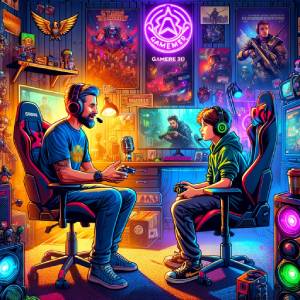 A proactive parental involvement is pivotal in preventing video game addiction in children and adolescents. Implementing effective strategies can help maintain a healthy balance between gaming and other aspects of life.
A proactive parental involvement is pivotal in preventing video game addiction in children and adolescents. Implementing effective strategies can help maintain a healthy balance between gaming and other aspects of life.
Here are some key prevention strategies that parents can adopt:
Set Healthy Boundaries
-
Establish Time Limits: Implement clear rules regarding the amount of time your child can spend on video games each day. Be consistent with these limits.
-
Encourage Breaks: Promote regular breaks during gaming sessions to reduce continuous screen exposure and sedentary behaviour.
-
Monitor Game Content: Be aware of the content and age-appropriateness of the games your child plays.
Promote Alternative Activities
-
Encourage Diverse Interests: Actively encourage your child to pursue hobbies and interests outside of gaming, such as sports, arts, music, or reading.
-
Family Time: Plan family activities that are engaging and enjoyable for everyone. This not only provides a healthy alternative to gaming but also strengthens family bonds.
-
Social Interaction: Encourage your child to spend time with friends in person and engage in group activities that foster social skills.
Fostering Open Communication
-
Discuss Gaming: Talk openly about gaming, understand why your child enjoys it, and discuss the importance of balance and moderation.
-
Educate About Risks: Inform your child about the potential risks associated with excessive gaming, such as its impact on health, social life, and academics.
- Listen Actively: Be an active listener. Show interest in their gaming experiences and be open to hearing their perspective.
Role Modeling
-
Set an Example: Demonstrate healthy technology use yourself. Children often emulate their parents’ habits and attitudes.
- Shared Gaming Experience: Occasionally play video games with your child. This not only helps in understanding their interest but also provides an opportunity to interact and bond.
Create a Balanced Environment
-
Physical Environment: Keep gaming consoles in a common area of the home rather than in the child’s bedroom. This allows for better monitoring and reduces isolated gaming.
- Encourage Physical Activity: Ensure your child engages in regular physical exercise, which is crucial for both physical and mental health.
Monitor and Adjust
-
Observe Behaviour: Keep an eye out for any warning signs of video game addiction. If you notice changes in behaviour, mood, or academic performance, it may be time to reassess the gaming habits.
- Adjust Strategies as Needed: Be flexible and willing to adjust your strategies as your child grows and as their needs and circumstances change.
Prevention of video game addiction is about striking a balance and creating a supportive environment where gaming is just one of many activities your child is engaged in. It’s about guiding them towards healthy habits, not just in gaming but in their overall lifestyle. If concerns persist despite these strategies, seeking professional advice may be beneficial to address the issue more effectively.
Intervention at Home: What Parents Can Do
When parents suspect their child might be developing an unhealthy relationship with video games, early and thoughtful intervention is key. Here are some practical steps parents can take:
Establish Clear Rules and Consequences
-
Set Boundaries: Clearly define the amount of time and specific times of day when gaming is allowed. Be consistent in enforcing these rules.
-
Consequences: Establish and communicate the consequences for not adhering to these rules. Ensure that these consequences are fair and consistently applied.
Engage in Shared Activities
-
Family Time: Plan activities that the whole family can enjoy together. This can range from outdoor activities to board games, movie nights, or even cooking together.
-
Participate in Their World: Show interest in their gaming world. Occasionally play games with your child to understand their interest better and create shared experiences.
Understand Your Child’s Perspective
-
Open Dialogue: Engage in conversations about their gaming experiences, their favorite games, and what they enjoy about gaming. This can provide valuable insights into their world.
- Listen Actively: Be an empathetic listener. Acknowledge their feelings and views even if you don’t always agree. This helps in building trust and understanding.
Promote Alternative Interests
-
Encourage Hobbies: Support and encourage your child to develop hobbies and interests outside of gaming. This could be sports, arts, music, reading, or any other constructive activity.
-
Social Engagement: Encourage your child to participate in social activities, whether it’s spending time with friends, joining clubs, or engaging in community events.
Foster a Healthy Environment
-
Limit Access: Consider limiting the number of gaming devices in the home or removing them from the child’s bedroom to discourage late-night gaming.
- Model Behavior: Demonstrate balanced technology use yourself. Children often mirror their parents’ habits.
Monitor and Adapt
-
Stay Informed: Keep yourself updated about the games your child plays and the content they are exposed to.
- Be Flexible: Be ready to adapt your strategies as your child grows and as the dynamics of the situation change.
Seek Support When Needed
-
Professional Help: If you observe persistent issues or your interventions aren’t having the desired effect, don’t hesitate to seek help from a child psychologist or counsellor.
- Educational Resources: Utilize resources like parenting workshops, online forums, and literature on managing gaming habits in children.
Intervening in a child’s potential video game addiction requires a balanced approach that respects their interests while setting healthy boundaries. It’s about guiding them towards a more balanced lifestyle and helping them develop a broader range of interests and coping mechanisms. Remember, each child is unique, and what works for one may not work for another. Flexibility, empathy, and open communication are the cornerstones of effective intervention.
Seeking Professional Help: When and How
Recognizing when it’s time to seek professional help and understanding the available resources can be crucial in effectively addressing this issue.
When to Seek Professional Help
-
Persistent Problems Despite Interventions: If the child continues to exhibit addictive behaviors despite parents’ efforts to set boundaries and encourage other activities, it may be time to consult a professional.
-
Significant Impact on Daily Life: Seek help if the child’s gaming habit is severely affecting their academic performance, physical health, social interactions, or family life.
-
Emotional or behavioural Changes: Noticeable changes in mood, behaviour, or personality linked to gaming, such as increased aggression, depression, anxiety, or withdrawal from family and friends, warrant professional attention.
- Physical Health Concerns: If gaming is leading to significant physical health issues like chronic sleep disturbances, significant weight loss or gain, or repetitive strain injuries, professional guidance is advisable.
Types of Professionals Who Can Assist
-
Child Psychologists: Psychologists specialize in understanding the mental and emotional aspects of addiction and can provide therapy to address underlying issues and develop healthier coping mechanisms.
-
Child Psychiatrists: Psychiatrists are medical doctors who can diagnose and treat mental health disorders, and they can prescribe medication if necessary.
-
Licensed Professional Counselors (LPCs): LPCs offer counselling services, focusing on behavioural interventions and helping the child develop skills to manage their gaming habits.
-
Family Therapists: These therapists work with the entire family to improve communication, solve family problems, understand family dynamics, and create a better-functioning home environment.
- School Counselors: They can provide support and guidance within the educational setting and can collaborate with teachers and parents to support the child’s overall well-being.
Treatment Approaches
-
Cognitive-Behavioural Therapy (CBT): CBT is effective in treating video game addiction by helping children recognize and change unhealthy patterns of thought and behaviour related to gaming.
-
Family Therapy: This approach involves family members in the treatment process to improve family dynamics and support the child’s recovery.
-
Behavioural Interventions: These involve setting and enforcing limits on gaming, establishing routines, and promoting alternative activities.
-
Group Therapy: Especially beneficial for older children and adolescents, group therapy provides peer support and helps develop social skills outside of the gaming context.
- Educational Workshops: Some therapists and organizations offer workshops to educate children and parents about the risks of excessive gaming and strategies to maintain a healthy balance.
How to Seek Help
-
Consult Your Pediatrician: Start by discussing your concerns with your child’s pediatrician, who can provide initial advice and referrals.
-
Research Specialists: Look for professionals who specialize in child and adolescent mental health and have experience dealing with behavioural addictions.
-
Check Credentials: Ensure that the professional you choose is licensed and has relevant experience.
- Insurance and Cost: Consider the cost and whether the services are covered by your health insurance.
Seeking professional help for video game addiction should be a supportive and non-judgmental process, focusing on the child’s overall well-being. Seeking help should not be viewed as a failure, but as a proactive step towards the health and happiness of their child and family.
Recovery and Support
Recovery is a journey that involves not just the individual child, but also their family and wider support network. Here are key aspects of the recovery process, along with strategies for maintaining a balanced lifestyle post-recovery.
Understanding the Recovery Process
-
Individualized Approach: Each child’s path to recovery will be unique, based on their specific circumstances, personality, and the severity of the addiction.
-
Gradual Reduction: Abruptly stopping gaming can be challenging and counterproductive. A gradual reduction in gaming time, under professional guidance, is often more effective.
-
Addressing Underlying Issues: It’s crucial to identify and address underlying emotional or psychological issues that may have contributed to the addiction, such as social anxiety, depression, or low self-esteem.
-
Developing New Skills: Part of recovery involves developing new coping skills, social skills, and hobbies to replace gaming.
- Family Involvement: Family plays a critical role in recovery. Parents and siblings should be involved in the treatment process, learning how to support the child effectively.
Support Groups
-
For Children and Adolescents: Joining a support group can provide peer support, reduce feelings of isolation, and offer a platform to share experiences and strategies.
- For Parents: Parent support groups are invaluable for sharing experiences, gaining insights, and receiving emotional support from other parents navigating similar challenges.
Maintaining a Balanced Lifestyle Post-Recovery
-
Structured Routine: Establish a daily routine that balances gaming with other activities, including school, chores, hobbies, and family time.
-
Continued Monitoring: Regularly monitor and adjust gaming time, remaining vigilant for potential signs of relapse.
-
Encourage Healthy Activities: Promote participation in physical activities, outdoor recreation, and social events to ensure a well-rounded lifestyle.
-
Ongoing Communication: Maintain open and ongoing communication with your child about their gaming habits, feelings, and experiences.
-
Educational and Career Goals: Encourage the child to focus on their educational and career aspirations, which can provide motivation and a sense of purpose beyond gaming.
-
Professional Support: Continued check-ins with a mental health professional can help maintain the gains made in recovery and provide ongoing support.
- Building Resilience: Work on building resilience and coping strategies to handle stress and challenges without reverting to excessive gaming.
Recovery from video game addiction is not just about reducing gaming time; it’s about creating a fulfilling and balanced life. The goal is to equip the child with the skills and support they need to enjoy gaming in moderation while pursuing a range of interests and activities. As with any recovery process, there may be setbacks, but with persistence, support, and the right strategies, long-term success is achievable.
Role of Schools and Community
I believe there is a critical role that schools and community organizations play in the prevention and support of video game addiction among children and adolescents. These institutions are pivotal in shaping the environment in which young individuals spend a significant amount of time and can offer valuable resources for education, awareness, and support.
Role of Schools
-
Education and Awareness: Schools can integrate lessons about digital literacy and healthy technology use into their curriculum. This education should include the risks associated with excessive gaming, such as addiction and its impact on mental and physical health.
-
Counselling Services: School counsellors should be equipped to recognize signs of video game addiction and provide initial counselling and referrals to additional resources.
-
Extracurricular Activities: Offering a variety of clubs and activities can provide students with alternative outlets for entertainment, socialization, and skill development, reducing the overreliance on video games for these needs.
-
Parental Engagement: Schools can host workshops and seminars for parents to educate them about video game addiction, its signs, and strategies for prevention and intervention.
- Peer Support Programs: Establishing peer mentoring or support groups can help students share experiences and strategies for managing gaming habits.
Role of Community Organizations
-
Recreational Programs: Community centres and organizations can offer a range of recreational and hobby-based programs that provide children and adolescents with alternatives to gaming.
-
Support Groups: Community centres can host or sponsor support groups for both young people struggling with gaming addiction and their families.
-
Awareness Campaigns: Conducting awareness campaigns through local events, flyers, and social media can help spread information about video game addiction and available resources.
-
Partnerships with Mental Health Professionals: Collaborating with local psychologists, therapists, and counsellors can provide specialized support and resources for those in need.
- Accessible Resources: Community libraries and centres can provide resources such as books, brochures, and online materials on managing screen time and gaming addiction.
Collaborative Efforts
-
Collaboration Between Schools and Communities: Schools and community organizations should work together to create consistent messages and strategies for addressing video game addiction.
-
Involvement in Policy Making: Both schools and community organizations can play a role in advocating for policies that promote healthy digital habits among children and adolescents.
- Research and Feedback: Engaging in or supporting research on video game addiction and using feedback from these studies to improve prevention and intervention strategies.
Schools and community organizations are in a unique position to offer a supportive network that addresses video game addiction through education, alternative activities, and resources for support. Their collaborative efforts can create a comprehensive approach to help children and adolescents navigate the challenges of digital life and promote overall well-being.
FAQ: Video Game Addiction
-
How do I differentiate between a healthy interest in gaming and an addiction?
Healthy gaming is characterized by balanced play that doesn’t interfere with daily responsibilities, social interactions, and physical health. In contrast, addiction is marked by excessive gaming that leads to neglect of responsibilities, social withdrawal, and negative impacts on physical and mental health.
-
Can video game addiction lead to other mental health issues?
Yes, excessive gaming can be associated with mental health issues such as depression, anxiety, and social phobia. However, it’s important to note that these conditions can be both a cause and a consequence of gaming addiction.
-
Is there a specific amount of gaming time that indicates addiction?
Addiction is less about the exact number of hours spent gaming and more about the impact it has on the individual’s life. If gaming starts to interfere with daily responsibilities, relationships, and health, it’s a cause for concern.
-
What should I do if I suspect my child is addicted to video games?
Start by having an open and empathetic conversation with your child about your concerns. Set clear and consistent boundaries around gaming. If the problem persists, consider seeking help from a mental health professional.
-
Are certain games more addictive than others?
Games designed with frequent rewards, social elements, and competitive aspects can be more engaging and potentially addictive. However, addiction depends more on the individual’s usage patterns and less on the specific type of game.
-
How can schools help in managing video game addiction?
Schools can play a role by educating students about healthy gaming habits, providing resources and support for those struggling with addiction, and encouraging alternative activities and interests.
-
What kind of treatment is available for video game addiction?
Treatment often involves behavioural interventions, family therapy, and individual counselling. Cognitive-Behavioral Therapy (CBT) is commonly used to treat gaming addiction.
-
How can I prevent video game addiction in my child?
Encourage a balanced lifestyle with diverse interests and activities. Set clear rules about gaming time and monitor the content of the games. Foster open communication about digital habits and be a role model for balanced technology use.
-
Does gender play a role in video game addiction?
Research has shown that video game addiction can affect all genders, but patterns of play and types of games preferred can vary. It’s important to be vigilant and supportive regardless of gender.
-
Can video game addiction be completely cured?
While ‘cure’ might not be the appropriate term, effective management and recovery are certainly possible. With the right support and intervention, individuals can learn to manage their gaming habits and lead a balanced life.
Emerging Trends and Future Outlook
Over the years significant changes in the landscape of video gaming and technology have occurred, which have implications for video game addiction in children and adolescents. Looking towards the future, several emerging trends and their potential impact on addiction are becoming increasingly important to consider.
Emerging Trends in Gaming and Technology
-
Virtual Reality (VR) and Augmented Reality (AR): The immersive nature of VR and AR technologies can lead to more intense gaming experiences. While they offer innovative and engaging ways to play, they also pose a risk of deeper immersion that could potentially exacerbate addictive behaviours, especially if the line between game and reality becomes blurred.
-
Mobile Gaming: The ubiquity of smartphones has made gaming more accessible than ever. Mobile games are designed to be played in short bursts but can encourage continuous play through notifications and easy accessibility, increasing the risk of compulsive gaming habits.
-
Social Gaming: Online multiplayer games and social platforms within games encourage continuous engagement. The social aspect can be a double-edged sword, providing a sense of community while potentially leading to peer pressure to spend more time in-game.
-
Games as a Service (GaaS): This model, where games are continually updated and expanded, can lead to prolonged engagement with a single game. The constant addition of new content can make it harder for players to “complete” a game and step away.
- Loot Boxes and In-Game Purchases: These features can be particularly enticing and potentially problematic, as they often use randomized reward mechanisms similar to gambling, which can be addictive.
Future Outlook and Research
-
Increased Awareness and Research: As awareness of video game addiction grows, we can expect more comprehensive research examining the psychological, social, and neurological aspects of gaming addiction. This research will be crucial in developing effective treatment and prevention strategies.
-
Preventive Measures and Parental Control Tools: With growing concerns about video game addiction, game developers and technology companies might face increased pressure to incorporate more robust parental control tools and in-game features that encourage healthy gaming habits.
-
Integration with Mental Health Services: Video game addiction is likely to become more recognized within mental health services, leading to better integration of gaming-related issues in standard psychological and psychiatric care.
-
Educational Initiatives: We can anticipate more educational programs aimed at children, parents, and educators, focusing on promoting a balanced approach to gaming and technology use.
- Tailored Therapeutic Approaches: Future treatment methods might become more tailored to individual needs, considering the diverse nature of video games and the different ways in which people interact with them.
As we move forward, it’s essential to continue monitoring these trends and adapting approaches to prevention and treatment. The goal is not to vilify video games but to promote a balanced, healthy relationship with technology in our increasingly digital world.
Resources and Further Reading
I recommend various resources for parents, educators, and healthcare professionals seeking further information and support on video game addiction in children and adolescents.
Here’s a list of valuable resources:
Online Resources
-
American Psychological Association (APA) – www.apa.org: Offers a wealth of information on psychological topics, including articles and research on video game addiction.
-
Child Mind Institute – www.childmind.org: Provides resources and articles on children’s mental health, including the impact of video games.
-
Center for Internet and Technology Addiction – www.virtual-addiction.com: Directed by Dr. David Greenfield, an expert in internet and technology addiction, offering resources and self-assessment tools.
-
Common Sense Media – www.commonsensemedia.org: Offers reviews and advice on children’s media and technology use.
- Cyberpsychology Research Group – cyberpsychology.eu: Provides insights into the latest research in the field of cyberpsychology, including gaming addiction.
Books
-
“Reset Your Child’s Brain” by Victoria L. Dunckley: Focuses on the impact of screen time on children and offers a plan to reverse negative effects.
Amazon Link – We have no affiliation with this.
- “Cyber Junkie: Escape the Gaming and Internet Trap” by Kevin Roberts: Provides insight into internet and video game addiction, along with recovery strategies.
Amazon Link – We have no affiliation with this.
- “The Tech Diet for your Child & Teen” by Brad Marshall: Offers advice for managing children’s technology use.
Amazon Link – We have no affiliation with this.
These resources can provide valuable insights, support, and practical strategies for addressing video game addiction. It’s important to remember that each case is unique, and these resources should complement professional advice tailored to individual circumstances.
Author:
 |
Lionel Thomas Father, Gamer and Founder with a Passion for Health, AI, Environment and Gamification of Life. |
Author Tools:
- Grammarly (Spelling and Grammar)
- ChatGPT (Content Enhancements & Research)
- GSpeech (Audio by AI)
- Other Tools (AI)...
Artists:
- Lionel Thomas using DALL-E 3 [AI Generated] (Header, Content)
References:
-
1. Media and Children
American Academy of Pediatrics Announces New Recommendations for Children's Media Use
https://www.aap.org/en/patient-care/medi...
The AAP recommends that parents and caregivers develop a family media plan that takes into account the health, education and entertainment needs of each child as well as the whole family.
-
2. Healthy Limits on Video Games
Child Mind Institute
https://childmind.org/article/healthy-li...
Summary:
The vast majority of children and adolescents in the United States play video games, and while many do so in moderation without any adverse effects, some become obsessed with gaming, leading to neglect of responsibilities and social isolation. In the excerpt from "Pause and Reset: A Parent’s Guide to Preventing and Overcoming Problems With Gaming" by Nancy M. Petry, PhD, practical strategies are offered to help parents limit gaming to a healthy level.
-
3. Youth and online gaming - state of play
eSafety Commissioner
https://www.esafety.gov.au/research/yout...
Summary:
The eSafety's 2017 Youth Participation Survey published a report investigating the experiences of young people in Australia with online gaming and in-game bullying. The report reveals that online multiplayer gaming is an extremely popular pastime among young Australians, with 60% of respondents aged 8 to 17 engaging in these games, and almost 50% have played eSport video games. However, the study also revealed that approximately 17% of multiplayer gamers had encountered in-game bullying, demonstrating a need for interventions and protective measures in this digital sphere.
-
4. Gaming disorder
World Health Organization (WHO)
https://www.who.int/standards/classifica...
-
5. Healthy Limits on Video Games
Child Mind Instituate
https://childmind.org/article/healthy-li...
Summary:
In the United States, video gaming is a prevalent activity among children and adolescents. While many engage in gaming moderately without adverse effects, some develop an obsession. Concerns arise when children neglect homework for games, lose sleep due to late-night gaming, or socialize less in person. Parents often struggle when children conceal their gaming extent.
Adapted from "Pause and Reset: A Parent’s Guide to Preventing and Overcoming Problems With Gaming" by Nancy M. Petry, PhD, the excerpt offers practical strategies for parents to manage their child's gaming. It emphasizes the importance of setting and enforcing limits on gaming, suggesting that parents should largely determine these for children and adolescents. The guidelines include ensuring gaming occurs only after responsibilities, setting daily and weekly time limits, and having no-game days. Reassessment of rules, enforceable consequences for rule-breaking, monitoring game content, and consistent rule application are key. Additionally, replacing gaming with other activities and offering positive reinforcement for non-gaming activities are advised. This approach aims to balance gaming with other aspects of life and prevent or address excessive gaming behaviors.
-
6. Video Game Addiction
Psychology Today
https://www.psychologytoday.com/au/basic...








 Snacks
Snacks Water
Water Eye Sight
Eye Sight Hearing
Hearing














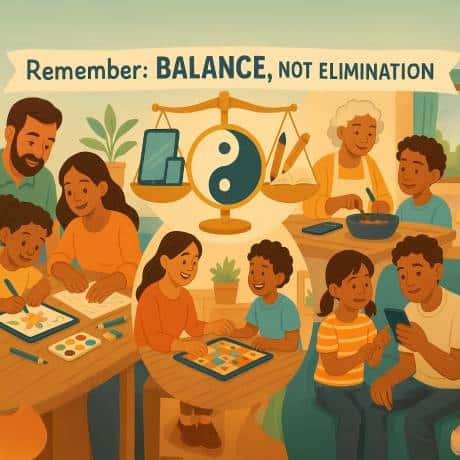

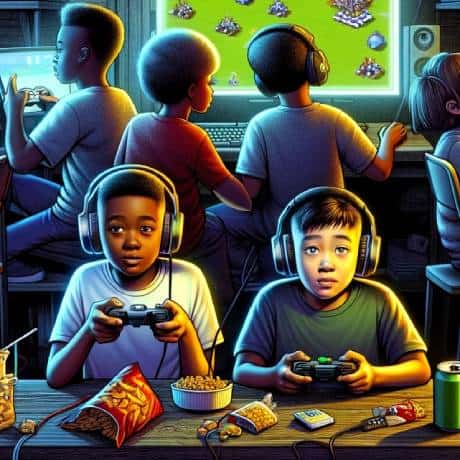





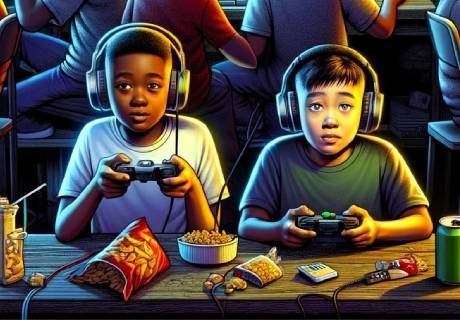
 Screen Time
Screen Time Play Sports
Play Sports


